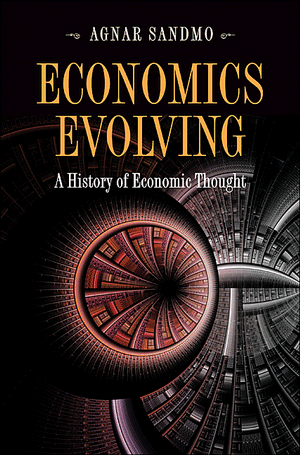Following an email exchange with
Dan Kuehn and
Jon Catalán, I decided that it was finally time to write up a review for Agnar Sandmo's "
Economics Evolving" (which I have been punting for some time). Full disclosure is that I know Agnar personally and think that he is a tremendous economist. That said, I started his book before I had actually spoken much to him and honestly believe that I judged it on nothing else but the merits of its content.
And with that,
here is the review which I have just posted on Amazon:
...
In his masterful
Wealth & Poverty of Nations, economic historian David S. Landes opens with a quip that "Geography has fallen on hard times." I have often wondered whether the same might said of history -- at least when it comes to cataloguing the development of economic thought. Despite the efforts of Landes and co. (who arguably tend to focus more on events rather than thinkers), this subject is sorely absent from the modern economic curriculum.
Agnar Sandmo's excellent
Economics Evolving (
EE) will hopefully go some way towards remedying that. The book is a compelling history of economic thought, told through the lives and works of the key figures that have shaped the field. The text is lucid and jargon free, so that even complex ideas are conveyed with a clear simplicity. My impression is that any lay person with an interest in economics could pick up the book and gain a deep understanding of the subject. (I personally happened to read
EE while doing my graduate studies in economics and it really helped to keep the overarching ideas clear in my head. This can be surprisingly difficult at times, when getting wrapped up in the mathematics or technical arguments of a particular theory might hinder you from seeing the wood for the trees. The concise description of various concepts -- from Walrasian Equilibrium to growth theory -- thus provided a welcome foil to the analytical rigour required by my core grad courses.)
Each chapter or subsection opens with an brief biography of the featured economist(s). These provide valuable context to the overall discussion and are typically interspersed with interesting vignettes and anecdotes. One of my favourites occurs on p. 90, where Sandmo reproduces a letter from John Stuart Mill to the philosopher Jeremy Bentham. The former is enquiring after the 3rd and 4th volumes of Hooke's Roman History, having "recapitulated" the 1st and 2nd volumes. Sandmo points out that this seemingly unremarkable correspondence between two leading intellectuals of the time was actually written when Mill had only just turned six! Mill's almost impossible precocity serves as the ideal backdrop for describing his many later contributions -- in both economics and philosophy -- during the pages that follow.
Sandmo, a fairly eminent economist in his own right, is never less than evenhanded in his discussion of the key figures and thinkers that have shaped the development of economics. His writing is admirably free of ideological bias and I appreciated not being able to necessarily tell which side the author would personally lean to on different economic questions. That is not to say that he is never critical, however, as
EE succinctly highlights the faults in many arguments and theories. (E.g. In an interesting chapter on the economic theories of Karl Marx, we are told how a falling rate of profit is a supposedly inevitable feature of capital accumulation, and how this in turn would eventually lead to the entire system collapsing. Sandmo counters (p. 133): "Each element in his chain of reasoning may be criticized", and convincingly proceeds to do exactly that.)
Of course, not everyone's favourite economist can feature prominently (or even at all) in a book that is designed above all to be concise and readable. However, I think it is fair to say that the major players are all covered in admirable depth, as well as numerous others. I particularly enjoyed the sections on the classicists (Malthus, Say, Ricardo, and Mill) and the forerunners to the "Marginal Revolution" (Gossen, Dupuit, Cournot, and Thünen). These are the kinds of tremendously important figures that are normally relegated to the footnotes in most modern economic curricula, and it was refreshing to get a full sense of their contributions and beliefs. I found it intriguing, for instance, to see how well they had often anticipated later developments in the science and continued to have relevant insights for our own economic circumstances of the present day. (It was equally interesting to get a sense of how their views have either been distorted or successfully reproduced by later thinkers.)
In summary, this book is a wonderful companion to any student of economics, and many others besides. I can easily recommend it.


